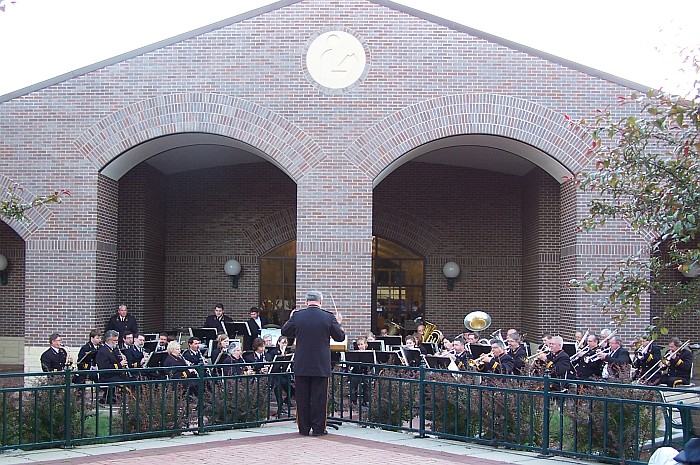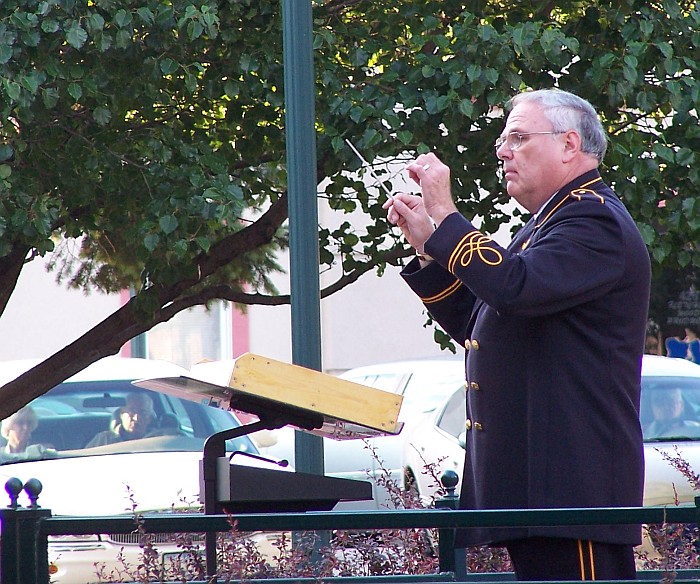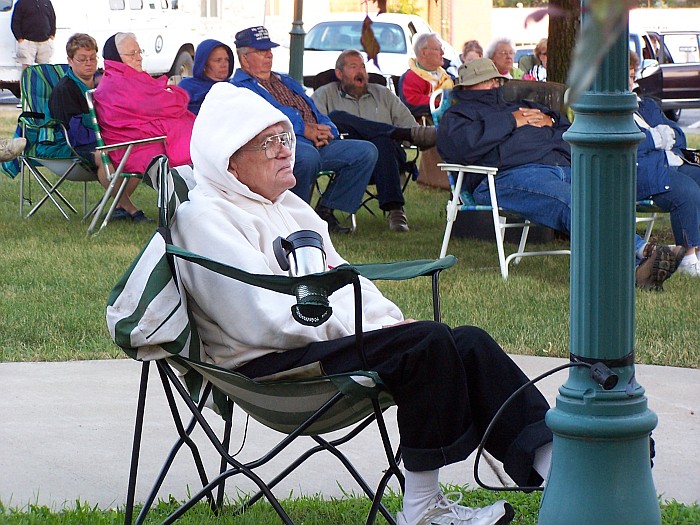The 2006 Summer Concert Series

The 2006 Summer Concert Series

The Karl King Band is performing in front of the Fort Dodge Public Library. With the renovation of the Karl King Bandshell in Oleson Park still in progress, again this year there was a need to move the location of the traditional Sunday night concerts. Known to many residents as the City Square, the park was renamed Karl L. King Park several years ago by the Fort Dodge City Council.

Jerrold Jimmerson, conductor
Karl L. King Municipal Band of Fort Dodge,
Iowa
It is indeed exciting to be playing in this park named after the bandís director for 50 years, commented Jerrold Jimmerson, current conductor of the Band. For those of us who performed under Mr. Kingís direction there, we will be seated almost exactly on the location where the former bandstand was.The former bandstand, proudly dedicated on May 8, 1930, was used each summer through the 1970 season for Thursday night concerts. However, it had fallen into disrepair and was last used during the summer season of 1970. Following Mr. Kingís death in March of 1971, the Thursday night concerts were discontinued, and the bandstand was eventually torn down. The Sunday night concerts, however, have continued to this day in Oleson Park.
The opening concert of the season was held on June 11 and featured patriotic music in observance of the Flag Day Holiday. Marches included on the program were Emblem Of Freedom by Karl L. King and Flying With The Colors by W. B. Green. Americaís national march, The Stars and Stripes Forever, by John Philip Sousa closed the concert.American Overture for Band, written by Joseph Willcox Jenkins in 1955, was the eveningís overture. It is one of the classic contemporary overtures written for the modern concert band, and features the French Horn section. The band also performed a recently published arrangement of songs from Americaís history, entitled Broad Stripes and Bright Stars by Robert Longfield.
On the lighter side was Guadalcanal March from the popular television series, Victory At Sea, which was set during World War II; the Civil War Patrol, The Blue and Grey, and the music of Karl L. King once again with his Majestic Galop and a clown novelty, The Walking Frog. Music from all five branches of the military were played during the Armed Forces Salute medley, and audience members and/or their families were invited to stand in recognition of military service
Dick Johnson, from Great Falls, Montana, was the special guest for the evening. The band premiered his new march, Oley Speaks, and then Mr. Johnson joined the band to narrate Duty, Honor, Country, based on a speech made by General Douglas MacArthur to the graduates of West Point.
Mr. Johnson is an Eagle Grove native who came to Fort Dodge to join the local radio station KVFD AM-FM in 1950. He joined Fort Dodgeís local television station, KQTV as Artist/Announcer, and then as Newsman in 1956. Mr. Johnson started the once-familiar Uncle Dickís Funhouse program about 1958. It was about that same time that Karl L. King invited him to join the Municipal Band as the Bass Drummer, which he played for many years. Mr. Johnson also sang with the local Barbershop Chapter, and was once a member of the popular Chord Huskers Quartet.
This special Flag Day concert closed with our National Anthem, The Star-spangled Banner.
June 18
True to the bandís tradition and heritage, the concert featured several marches, including King Henry, Woody Vanís and Samson, along with the circus galop, Royal Hippodrome, all written by the bandís namesake, Karl L. King. Two selections by Henry Fillmore, His Honor March, and the novelty, Shoutiní Liza Trombone, were also on the program..Other selections included the overture, Barber of Seville, by the Italian composer Gioacchino Rossini. This opera, first performed in Rome in 1816, was unsuccessful at first, but is said to have pleased Rossini most of all his compositions. It has now become recognized as one of the greatest of all comic operas. Lighter sounds included an intermezzo by Karl King, entitled Loverís Lane, and highlights from the movie, Superman, by John Williams.
Guest soloist for this concert was Dr. John D. Perkins on trumpet. Mr. Perkins, originally a native of Minnesota, performed the solo, Portrait Of A Trumpet, by Sammy Nestico. Mr. Perkins is currently on the faculty of Central Methodist University in Missouri, where he teaches applied trumpet and horn, coaches the brass quintet, and teaches music education courses. He previously served on the faculties of Shippensburg University in Pennsylvania, and Angelo State University in Texas. He also served as a music educator in a San Antonio area school district, and completed work on his Doctor of Musical Arts degree in trumpet at the University of Texas in Austin in 2001. He has also earned degrees from the University of Wisconsin at Madison and St. Cloud State University in Minnesota.
Mr. Perkins has made several solo appearances at the Grand Sousa Festival in Pennsylvania, and with the Hagerstown Municipal Band in Maryland, and the Shippensburg Community Orchestra in Pennsylvania, as well as having performed as a member of several orchestras while in Texas. He has also performed in Washington, D. C., along with several churches throughout the country.
Mr. Perkins was joined by two other members of the King Band trumpet section - his brother, Jim Perkins from Boone and Tim Miller from Humboldt - to play the trumpet trio, The Three Cardinals.
The concert closed with our National Anthem, The Star-spangled Banner.
Marches are always a popular treat on Sunday nights, and this concert featured some of Karl L. Kingís best-known compositions. They included Invictus, dedicated to Merle Evans, the bandmaster who succeeded King with the Ringling Brothers, Barnum and Bailey Circus; Woody Vanís, written in 1911 and dedicated to the bandmaster of Robinsonís Famous Shows when King played baritone with them; and Carrollton, written in 1909 and the first of many songs by King to be published with the Barnhouse Co. in Oskaloosa, Iowa. Other music by Karl L. King performed during the evening were June Twilight Waltzes and Circus Days Galop. In addition, the band performed March Grandioso, by Roland F. SeitzClassical offerings for the evening included Light Cavalry Overture, written in 1866 by Franz von Suppe, the father of the Austrian operetta. This overture was one of von Suppeís most popular and recognizable works. Sounds range from military melodies with vigorous rhythms to delicate Hungarian-like folk songs. Also on the program was Tannhauser March, written in 1843-44 by the German composer, Richard Wagner, for his opera of the same name.
On the lighter side was a medley of popular songs written by Cole Porter, including Anything Goes, Begin The Beguine, Night and Day, Just One Of Those Things, and Blow, Gabriel, Blow. Latin sounds from south of the border were heard on Paul Yoderís band classic, Relax! The Clarinet section of the band was featured on Russell Wardís Clarinet Escapade.
Three band directors from Texas who were traveling to spend the weekend in Fort Dodge were special guests for this concert. These directors were coming to research the life and music of Karl L. King. They were Jason Steele, director of bands at Pittsburg High School in Pittsburg, Texas, along with an assistant band director at Pittsburg Middle School and another high school director. These directors visited the Karl King Archives in the Fort Dodge Library. The music of King and his writing style are currently making a comeback among bands throughout Texas, and these directors wanted to get a feel of what Fort Dodge was like when Mr. King lived here. Mr. Steele was looking forward to meeting people who knew King and had played in the band under his direction. This is a once in a lifetime thing and Iím extremely excited, commented Steele.
Closing the concert was our national anthem, The Star-spangled Banner.
